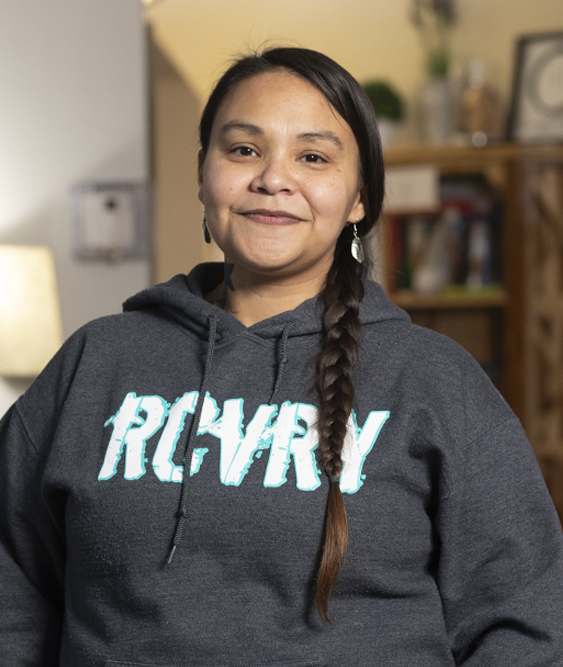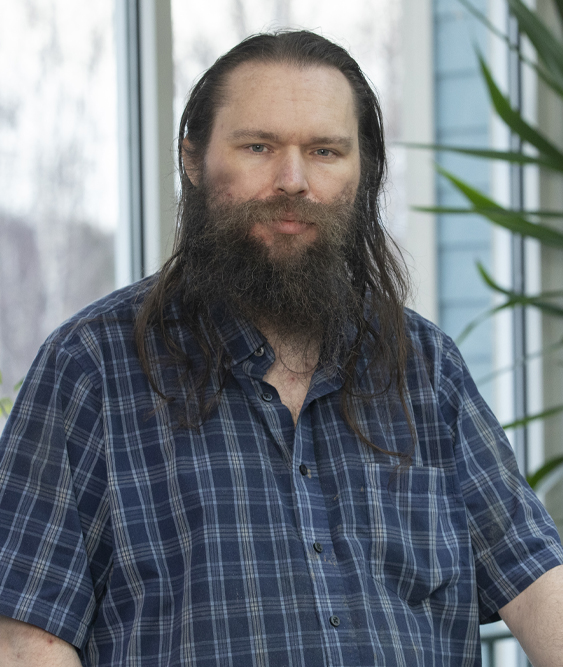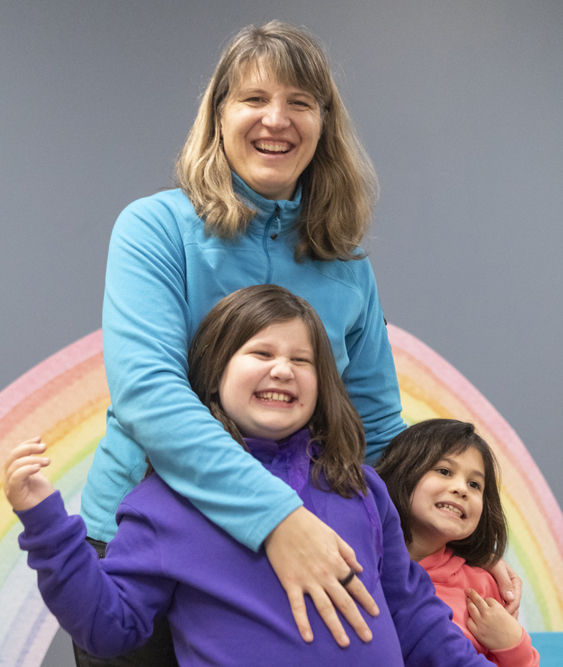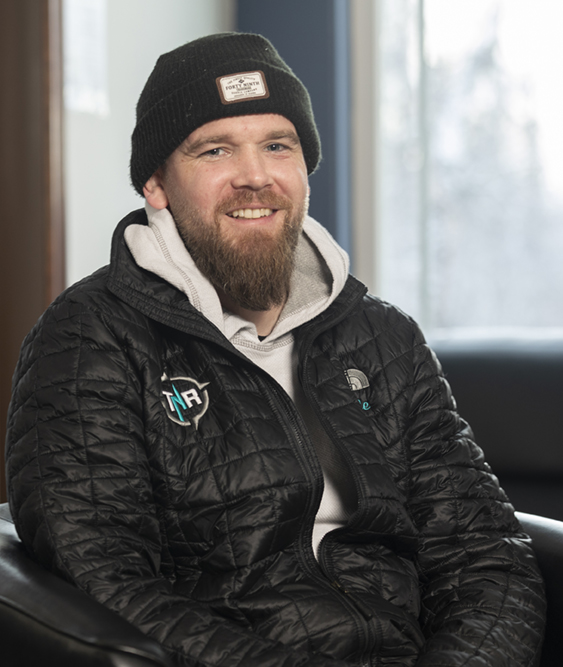What is
Stigma?
"People need to be able to see beyond the stigma."
Whether we realize it or not, most of us know someone who is a beneficiary of the Alaska Mental Health Trust. The Trust serves Alaskans who experience mental illness, intellectual and developmental disabilities, chronic alcohol or drug addiction, Alzheimer’s disease and related dementia, and traumatic brain injuries. They are our children, parents, siblings, friends, neighbors, and co-workers. Beneficiaries live in every corner of Alaska and come from all walks of life.
The Trust is committed to raising awareness about our beneficiaries – with a particular focus on the stigma many face every day. Stigma may be hard to see but, for Trust beneficiaries, stigma or stereotypes can get in the way of a job, or housing, or necessary services. It can also prevent people from seeking the help and support they need.
We’ve been meeting with beneficiaries across the state to hear their stories about how mental health stigma continues to impact their lives. Click below to hear from Brendan, Sallye, Karen and Jasmine, Trust beneficiaries and partners who have battled stigma.
“I’m really proud of my journey.” That’s what Brendan had to say as he considered his experiences with substance abuse and overcoming addiction. It was a long process, including periods of homelessness. But thanks in part to the team at True North Recovery – a Trust partner and grantee that provides drug and alcohol treatment in Wasilla – Brendan overcame his addiction and has been in recovery ever since.
His recovery was a team effort, as he connected with a sponsor, went through treatment, and found a lasting sobriety thanks to people like those at True North, who were always there for him throughout his journey. That’s part of the reason he now works there, as he understands the importance of what they do, sharing that they “believed in me until I could believe in myself.”
Maybe more than anything, Brendan’s recovery has given him “the freedom to make certain choices.” One of those he was most excited to make was to be a father to his two children. He’s proud of the connection they have built, one that may not have been possible without the support of his community and True North on his journey to recovery.
Growing up in Michigan, Sallye came to Alaska on a vacation and quickly realized it’s the one place more beautiful than her home. So, she moved here, and has been in Anchorage ever since. And for all 46 of those years, she’s dedicated her life to helping others in a variety of roles, most recently as a caregiver for Alzheimer’s Resource of Alaska, a Trust partner and grantee. In her experiences in that role, she quickly discovered that caring for those with Alzheimer's disease and dementia (ADRD) is “way more challenging than I ever thought it would be.”
But it’s also something she takes great joy from, especially in the relationship she has formed with the individual she is currently caring for. Sallye said, “the most rewarding part of being a caregiver is the bond,” and emphasizes that despite what someone might believe, individuals who experience ADRD “still have many skills, talents, and abilities.” That’s why she believes it’s important to “focus on what’s still there, not what’s gone.”
Sallye recognizes that stigma related to ADRD is widespread, and that adding those feelings on top of what those with dementia and their families are already dealing with can be a lot to handle. She recognizes that if someone carries stigma for those experiencing ADRD, it’s often because they simply don’t understand it. What she wants people to know is that Alzheimer’s Disease and Related Dementia is something you can’t control, just like any other disease, and that the “rest of us who can help need to help.”
Stigma
Trust research conducted in spring 2023 indicates that significant stigma remains attached to Trust beneficiaries. Throughout the survey, respondents expressed disproportionate negative sentiments toward Alaskans experiencing mental illness, substance misuse, and other challenges like Alzheimer’s disease and related dementia. These responses correlated to a decreased willingness among respondents to socialize with beneficiaries, welcome them to their family, or trust them in the workplace.
Trust beneficiaries experience stigma because of a lack of knowledge and understanding which can foster negative attitudes, language, and behaviors towards them. Not only can this gap in understanding cause barriers to employment, negatively impact relationships, and perpetuate stigma, it also contributes to reduced opportunities for recovery and prevents beneficiaries from seeking services that they need.
There is not just one specific type of stigma. It exists in a variety of forms and places and can also be self-imposed. Public, self, and institutional stigma create negative impacts that extend past the stigmatized individual to their families, friends, and support systems. The Trust is working to mitigate the direct and indirect harmful impacts of stigma. We hope you will join us in those efforts.
The Trust is committed to educating the public and decision makers about beneficiary needs and acting as advocates for equitable treatment. For 25 years, the Trust has worked with partners across the state to improve the lives of beneficiaries and to serve as a catalyst for change in Alaska’s mental health continuum of care. Each year, the Trust grants around $25 million to nonprofits, state agencies, Tribal organizations, local governments, and other partners for projects that promote long-term change and improve the circumstances of those we serve.
To learn more about ways to address stigma and to actively reduce the negative impacts of stigma for yourself, loved ones, and in your community, click the links below.
- Mental Health by the Numbers, National Alliance on Mental Illness (NAMI)
- Family Members and Caregivers, National Alliance on Mental Illness (NAMI)
- LISTEN: Teens Talk Mental Health to Combat Stigma, Alaska Public Media
- Stigma Reduction: Understanding Addiction to Support Recovery, Centers for Disease Control and Prevention (CDC)
- 9 Ways to Fight Mental Health Stigma (NAMI)
- Words Matter - Terms to Use and Avoid When Talking About Addiction National Institutes of Health (NIH)
- Helping a Loved One Cope with a Mental Illness, American Psychiatric Association (APA)
- Alzheimer’s Association: Overcoming Stigma
- One of Us: Combating Stigma Against People with Intellectual and Developmental Disabilities (APS)
- Brain Injury Awareness, Brain Injury Association of America (BIAA)
- Strengthening the System: Alaska’s Comprehensive Integrated Mental Health Program Plan 2020-24, Alaska DHSS
Meet our Beneficiaries
In her own words, Karen “worries about things a lot.” That stems from her experiences with severe mental illness, which comes with anxiety and other challenges that she must manage. But manage them she does, and she does so with the help of her community, something that’s a huge and valuable part of her life. At the heart of her community is her family; visiting with her mother in particular brings her a lot of joy.
That’s a word that describes Karen well: “joy.” While she’s felt stigma in her life, her community helps her overcome that and find things that bring her joy. Part of that community is Mat-Su Health Services, a community health organization based in the Matanuska-Susitna Valley that is a Trust partner and grantee. Karen shared that the MSHC team “always does what’s best for me.” What that means depends on the day, as team members join Karen for all kinds of adventures, whether that’s daily errands or experiencing fun activities together. She emphasized that they genuinely care about her, and “that means more than anything.”
“Because that’s what I need.”
Thanks to gains she’s made with the MSHC team, Karen now lives independently, something she takes great pride in. She gets to choose what everything looks like in her home, which she greatly appreciates. More than anything, she wants people to see her and her life and realize that she is “somebody who has grown leaps and bounds from the past.” She feels better than ever, and because of that positive energy, she believes she can make a difference in the lives of others.
Jasmine represents resilience. Once upon a time, she struggled with addiction, and it ultimately led to a traumatic experience that resulted in her being hospitalized for a year and a half. Medical professionals questioned whether she would ever walk or talk again, but Jasmine persevered.
Now, Jasmine is in recovery. Her experience inspired her to try and help others the way people once helped her. Jasmine’s life passion is “pull the hopeless out of the darkness and into the light.” She knows how stigma around addiction can impact someone, and through her experiences and her work as an addiction counselor at True North Recovery, a Trust partner and grantee in Wasilla she does everything she can to pay her experiences forward.
While her journey was a challenging one, it ultimately gave her purpose in life – much of which is oriented to helping others - and these days, Jasmine knows that her “purpose is the greatest joy.” Through her experiences, she became a mother, an advocate, and a community member, all of which means the world to her.

“I wish that people understood how much of a deterrent stigma is for people who need those services and really could benefit from those services. How much it deters them from even thinking about or seeking those kinds of things, the help that they really need. And I just wish that people weren't so negative about it.”
– Sharon, Trust Beneficiary

"Mental and physical problems can manifest simultaneously, which is not easy. You’re living with it, and you may not be aware of it for a number of years until you realize, "Oh, I actually have this problem, and now that I know, I need to start figuring out how to function better without assistance.”
– David, Trust Beneficiary

“People think you're a bad parent when your kid's having a meltdown. My daughter is autistic, and they just look at me like, ‘What did you do wrong?’ And I used to think, ‘Oh my gosh, I must be just a terrible person.’ And then as I've grown, I'm like, ‘No, she has different needs and reacts differently to things.’ And I've had to grow thicker skin. I've had to have more compassion for myself.”
– Caitlin, Parent of a Trust Beneficiary

“Secrets keep you sick. If you don't feel safe telling somebody what's really going on with you, with your mental health, you're not able to get the true help you need.”
– Josh, Trust Beneficiary

